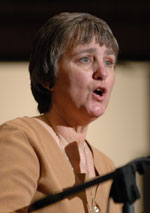Debbie Miller answers God’s call to offer post-abortion reconciliation
By Mary Ann Wyand
 Healing Hidden Hurts began as a result of prayer.
Healing Hidden Hurts began as a result of prayer.
Ten years ago, St. Anthony parishioner Debbie Miller of Indianapolis felt called by God to begin this confidential post-abortion reconciliation ministry for women.
“I felt the Lord was calling me to this ministry,” Miller said, which was inspired by her participation in Elizabeth Vecchio’s Victims of Choice reconciliation program in Naperville, Ill., for women suffering from the trauma of abortion.
Symptoms of post-abortion syndrome include feelings of loss, sadness, shame, guilt, depression, anxiety, panic attacks, severe emotional pain, relationship problems, anger, nightmares, drug and alcohol abuse, and other self-destructive behavior that may result in repeat abortions.
“All you know is that something is wrong,” Miller said, “that you are not acting or reacting normally in situations, and you have no idea how to fix it.”
The 10-step process of Healing Hidden Hurts focuses on God’s love, mercy and forgiveness, she said, as well as time spent before the Blessed Sacrament in prayer.
To educate people about her ministry, Miller shares her own abortion story, which dates back to 1977 and the early years of her 34-year marriage to Wallace “Wally” Miller.
It was a time when their financial situation was tenuous and they had two young children.
It was also just four years after abortion was legalized by the U.S. Supreme Court in its
Roe vs. Wade decision on Jan. 22, 1973, a time when women didn’t know that abortion is physically, emotionally, mentally and spiritually harmful.
“Women are really hurt by abortion,” Miller said, “but a lot of times they don’t understand how they have been affected because the symptoms [of post-abortion trauma] are not always recognizable to them. When women come for help 15 or 20 years later, they don’t realize the impact that the abortion has made on their life, and how it is still affecting them.”
After they learn the symptoms of post-abortion syndrome, she said, they are stunned.
“I’ve also talked with women that have experienced infant loss from miscarriage or stillbirth,” she said, “who tell me that they can identify with those symptoms.”
Women always regret their abortion decision, Miller said, and it is a decision that they have to live with for the rest of their life.
“They always regret that they don’t have that baby,” she said. “When they start the program, they are suffering and have a lot of pain. But we always have the hope that their child is with God and hopefully one day they will be reunited with their child.”
As part of the abortion reconciliation process, women name their babies.
“Naming is very important because it gives the child an identity and a dignity,” Miller said. “A lot of times, the woman will know instinctively that her child was a boy or girl and a name will come to her during prayer. … That’s very comforting for her. She is encouraged during the program to build a relationship with her child by writing a letter or note. Thinking about what she wants to say to her child is very helpful. This relationship continues to give her strength through prayer.”
The 10-step process involves revisiting the events of a woman’s life leading up to her crisis pregnancy and abortion experience, she said, as well as the assurance of God’s love, mercy and forgiveness so that she can forgive herself and find healing.
“This program meets the woman individually where she is in her faith life and in her place of pain,” Miller said. “Many women do not come forward until the pain is severe, and they feel forced to do something about it. Many times, the Lord will give her a nudge and then she knows it is right. … The Lord wants her to deal with the past and begin the path of healing. … Her faith frees her from the guilt, grief and shame of her past.”
(For more information about Debbie Miller’s Healing Hidden Hurts post-abortion reconciliation ministry, log on to www.healinghiddenhurts.org.) †
 Healing Hidden Hurts began as a result of prayer.
Healing Hidden Hurts began as a result of prayer.